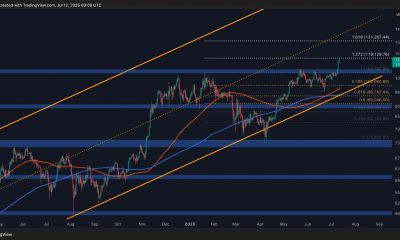Commodities
Gold prices muted before inflation data, copper sinks on Zambia discovery


Investing.com– Gold prices moved little in holiday-thinned Asian trade on Monday, with the yellow metal keeping to a trading range established over the past week as traders sought more cues from upcoming U.S. inflation data.
Among industrial metals, copper prices hit a near three-month low after KoBold Metals- a startup backed by Microsoft (NASDAQ:) founder Bill Gates, found a large copper deposit in Zambia that could form a major copper mine.
Waning expectations of early interest rate cuts by the Federal Reserve saw gold fall back into a $2,000 to $2,050 trading range in February, as markets began steadily pricing out chances of a rate cut in March and May.
A dearth of direct cues over the past week also gave gold few cues, with traders now looking to the upcoming consumer price index (CPI) data as the next big signal.
fell 0.1% to $2,023.48 an ounce, while expiring in April fell 0.1% to $2,037.20 an ounce by 00:07 ET (05:07 GMT). Trading volumes in the two were muted on account of market holidays in China, Hong Kong, South Korea and Japan.
CPI data, Fed signals in focus
Gold is expected to see little action ahead of U.S. on Tuesday. While the reading is expected to show that inflation eased further in January, price pressures are still expected to remain well above the Fed’s 2% annual target, giving the central bank more impetus to keep interest rates higher for longer.
Along with the inflation data, a sting of Fed officials, including , and are on tap this week.
Fed officials are expected to reiterate recent comments that the central bank is in no hurry to begin trimming interest rates. This notion had sparked steep losses in gold earlier in February, given that higher rates push up the opportunity cost of investing in the yellow metal.
The also remained in sight of a recent three-month high, keeping gold prices under pressure.
Still, gold managed to hold above the $2,000 an ounce support, although analysts cautioned that the level may be tested in the coming days.
Copper sinks on discovery of large deposit in Zambia
Copper prices fell on Monday, extending losses from the prior session on fears of a potential increase in global supplies.
expiring in March fell 0.4% to $3.6727 a pound- their weakest level since mid-November.
KoBold Metals, a start-up backed by Microsoft founder Bill Gates, said it had discovered a huge copper deposit in Zambia, which could potentially form one of the largest mines in the world.
Zambian President Hakainde Hichilema said that the deposit- found in the Mingomba Project- could produce between 500 to 600,000 metric tons of copper when operational. In comparison, Chile’s Escondida Mine- which is considered the world’s largest copper mine by production, produced about 1 million tons of copper in 2022.
The discovery points to a potential increase in copper supplies over the coming years- heralding more pressure on prices of the red metal, which usually benefit from tighter market conditions.
Copper was already nursing steep losses so far in 2024 amid persistent concerns over slowing demand in top importer China.
Commodities
Oil prices rise; U.S. crude inventories plunge, Russia-Ukraine truce eyed
Commodities
India’s Reliance to stop buying Venezuelan oil over US tariffs, sources say
Commodities
Oil prices climb on Venezuela supply worries

 Forex3 years ago
Forex3 years agoForex Today: the dollar is gaining strength amid gloomy sentiment at the start of the Fed’s week

 Forex3 years ago
Forex3 years agoUnbiased review of Pocket Option broker

 Forex3 years ago
Forex3 years agoDollar to pound sterling exchange rate today: Pound plummeted to its lowest since 1985

 Forex3 years ago
Forex3 years agoHow is the Australian dollar doing today?

 Cryptocurrency3 years ago
Cryptocurrency3 years agoWhat happened in the crypto market – current events today

 World3 years ago
World3 years agoWhy are modern video games an art form?

 Commodities3 years ago
Commodities3 years agoCopper continues to fall in price on expectations of lower demand in China

 Economy3 years ago
Economy3 years agoCrude oil tankers double in price due to EU anti-Russian sanctions





























